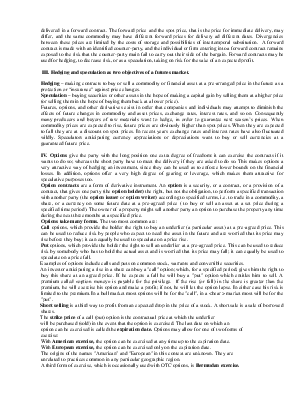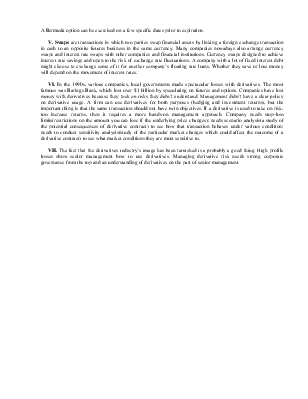


DERIVATIVES AND FUTURES
I. A derivative is a financial instrument that derives or gets its value from some real good or stock. It is in its most basic form simply a contract between two parties to exchange value based on the action of a real good or service. Typically, the seller receives money in exchange for an agreement to purchase or sell some good or service at some specified future date.
A financial derivative is a tradable security whose value is derived from the actual or expected price of some underlying asset. Derivatives include futures contracts, futures on stock market indices, options, and swaps. Derivatives can be used as a hedge, to reduce risk, or for speculation. A derivative market is a market such as the London International Financial Futures and Options Exchange /LIFFE/ on which derivatives are traded.
The largest appeal of derivatives is that they offer some degree of leverage. Leverage is a financial term that refers to the multiplication that happens when a small amount of money is used to control an item of much larger value. A mortgage is the most common form of leverage.
Derivatives offer the same sort of leverage or multiplication as a mortgage. For a small amount of money, the investor can control a much larger value of company stock than would be possible without use of derivatives. This can work both ways, though. If the investor purchasing the derivative is correct, then more money can be made than if the investment had been made directly into the company itself. However, if the investor is wrong, the losses are multiplied instead.
II. Futures and forward contracts are known as financial derivatives .
A futures contract is a contract to buy or sell a good, share, or currency on a future date, at a price decided when the contract is entered into. A futures contract entails for both parties both the right and the obligation to trade; it is contrasted with an option, which confers only the right to trade on one party and only the obligation on the other. A futures contract obligates the seller to provide a commodity or other asset to the buyer at an agreed-upon date. Futures are widely traded for commodities such as sugar, coffee, oil and wheat, as well as for financial instruments such as stock market indexes, government bonds and foreign currencies.
The earliest known futures contract is recorded by Aristotle in the story of Thales, an ancient Greek philosopher. Believing that the upcoming olive harvest would be especially bountiful, Thales entered into agreements with the owners of all the olive oil presses in the region, in exchange for a small deposit months ahead of the harvest, Thales obtained the right to lease the presses at market prices during the harvest. As it turned out, Thales was correct about the harvest, demand for oil presses boomed, and he made a great deal of money. By the 12th century, futures contracts had become a staple of European trade fairs. In the United States, the Chicago Board of Trade opened the first futures market in 1868, with contracts for wheat, pork bellies and copper.
Exchanges play a vital role in futures trading. Each futures contract is characterized by a number of factors, including the nature of the underlying asset, when it must be delivered, the currency of the transaction, at what point the contract stops trading, and the tick size, or minimum legal change in price. By standardizing these factors across a wide range of futures contracts, the exchanges create a large, predictable marketplace.
So a futures market is a market organization through which futures contracts are traded. These contracts commit both parties to buy and sell commodities, shares, or currencies on a future date at a price fixed when the contract is made. To ensure that both parties will be able to carry out their side of the bargain, the actual contracts are made between each side and the market organization, which requires both parties to make margin deposits with it of a given percentage of the market price of a contract. In most futures markets no actual delivery is made: the difference between the contract price and the spot price when the contract matures is paid by one party to he market organization, and by the market organization to the other. If the spot price is above the contract price the futures buyer gains and the futures seller loses; the opposite holds if the spot price is below the futures price.
Уважаемый посетитель!
Чтобы распечатать файл, скачайте его (в формате Word).
Ссылка на скачивание - внизу страницы.